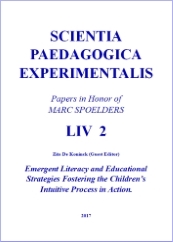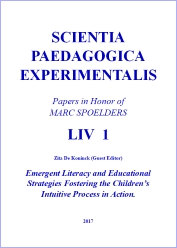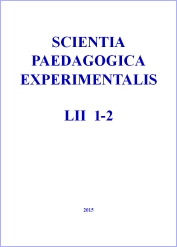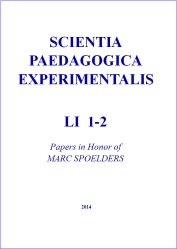|
SPE 55, 2 (2018)
|
|
||||||||||
|
ABSTRACTS |
|
|
Transculturality and Preschool Education – earnings from a Preschool Project in Wrocław/Poland. E. Chromiec
The article focuses on the current debate in the European scientific community on the change of the paradigm: from multiculturalism/interculturality to transculturalism/transculturality. Concepts of the theoreticians such as W. Welsch, A. Dagnino, M. Epstein are gradually gaining popularity in the Polish scientific community too. The text is also a presentation of an educational project “Multicultural Wrocław?” implemented in an English-language kindergarten in Wroclaw, with detailed accent on its multi-, inter- and transcultural background. |
|
|
Designing a Strategic Framework for European Computing Education and Training. P. Kaczmarski, M. Porta, B. Çiço, N. Frasheri, V. Cantoni, L. Wang, F. Vandamme Abstract: In this paper we summarize our research concerning the design of a long-term, large-scale strategic framework for European computing education and training programmes. Our conceptualization of the strategic framework for European ICT education is based on business process management (BPM) perspective, which is the key for defining a generic strategic framework. With this starting point, we review in this paper the generic strategic framework structure and discuss the design of the identified components from the perspectives of the European ICT education and European ICT job markets. The presented design focuses, among others, on the strategic goals, the priority areas, on convergence monitoring etc. We also present a new addition to the envisioned framework concerning standard ICT curricula adoption which enhances our original approach presented in (Porta, 2016a). It is important to note that, to date, there has been no attempt to provide a strategic framework for the area of computing education (the closest realisation has been the Strategic Framework for European Cooperation in Education and Training (EU-SF, 2009; EU-SF, 2012), which however covers different application areas and problem sets). Since the topic of designing and implementing a strategic framework for ICT is quite extensive, we focus in this paper on the preparation and design phases, and leave the implementation description to our future publication. |
|
|
The Nominalistic, Gnostic, Taoist, roots of Pedagogy. F. Vandamme Abstract: With this study it is investigated if and to what extent the nominalistic, Gnostic and Taoist traditions have influenced modern developments of Pedagogics in general and more particularly the pedagogical practice and research of Marc Spoelders. |
|
|
SPE 55, 1 (2018)
|
|
||||||||
|
ABSTRACTS |
|
|
Student Teachers’ and Teachers’ Attitudes towards Ecological Building of Schools Majda Cencič, Anton Mlinar
Studenten onderwijskunde evenals de onderwijzers/leraren en andere medewerkers, brengen heel wat tijd door in schoolgebouwen. De fysieke alsook de leeromgeving zouden daarom een positieve invloed moeten hebben en geenszins een belemmering zijn. Sommige onderzoeksresultaten stellen dat milieuvriendelijke of groene scholen een gezonder binnenmilieu hebben, wat betekent dat er minder ziektes zijn en dat het ziekteverzuimpercentage lager is; dat studenten ook beter presteren in dergelijke scholen; dat op ecologische scholen kinderen ook over een functionele leeromgeving beschikken, enz. Met betrekking tot deze bevindingen waren we geïnteresseerd om te bepalen wat de houding was van de studenten onderwijskunde ten aanzien van ecologische schoolgebouwen, daar bij een steekproef van onderwijzers in Sloveense basisscholen vastgesteld werd dat oudere leerkrachten ietwat positiever stonden tegenover ecologische schoolgebouwen dan hun jongere collega's. Met dit doel voor ogen hebben 299 studenten, toekomstige leraren van een faculteit Onderwijskunde, een vragenlijst ingevuld. Hun positieve houding ten aanzien van ecologische schoolgebouwen kwam daarin tot uiting. We hebben echter kunnen vaststellen dat de houding van de aspirant leraren jegens ecologische schoolgebouwen enigszins anders was van die van de praktiserende onderwijzers/leraren. De positie van deze onderwijzers/leraren was positiever dan die van de studenten onderwijs, wat aangeeft dat in het studieproces meer nadruk dient gelegd te worden op ecologische en duurzame ontwikkeling van scholen. |
|
|
Sprachunterricht: Tradition, Innovation, Experimente Bernd Spillner Samenvatting :
Allereerst worden twee zeer traditionele methoden voor vreemdetalenonderwijs besproken, de gespreksmethode (17e/18e eeuw) en de regel-vertaling methode (18e/19e eeuw). Hun voordelen worden onderzocht en de redenen waarom deze onbruikbare methoden zo lang in gebruik blijven worden geanalyseerd. Een korte omweg leidt ons naar Comenius, de voorloper van de semiotiek. Na te hebben besproken waarom zuiver taalkundige benaderingen zoals taxonomisch structuralisme, afhankelijkheidsgrammatica en generatieve transformatiegrammatica in de 20ste eeuw als taalonderwijsmethoden gedoemd waren te mislukken, worden Experimentele ('innovatieve') pogingen van de laatste 40 jaar kritisch geanalyseerd (onder meer taallabo, suggestopedia, autonomie van de leerling, drempelniveau, onderdompeling, TANDEM, e-learning). Hieruit kan afgeleid worden dat communicatief vreemdetalenonderwijs erkenning verdient.
|
|
|
A Review of Teacher Evaluation Beliefs Qiaoyan He, Qiu Ping Samenvatting : Het vertrouwen van leerkrachten in evaluaties heeft in de educatieve literatuur een aanzienlijke hoeveelheid aandacht gekregen, maar betrekkelijk weinig vanuit de literatuur die specifiek het vertrouwen zelf behandelt en onderzoekt. Als drijvende kracht lijkt “evaluatie” en “belief” zeer sterk op elkaar. Op basis van de student-gecentreerde en leraar-gecentreerde filosofie, geven we in de huidige paper een literatuuroverzicht om de essentiële componenten van de evaluatie “beliefs” te onderzoeken (waarom, wat, wie, wanneer en hoe), in relatie tot de grootste problemen van de hervorming van het Chinese nieuwe curriculum in verband met "waarom-doel", "wat-inhoud", "wie-relatie tussen leraar en student", "hoe-methode" en "wanneer-tijd". In overeenstemming met de bespreking van vijf factoren van evaluatie-overtuigingen, hebben we zes perspectieven voorgesteld om onderzoekers in de pedagogie te sturen bij verdere onderzoeken.
|
|
|
SPE 54, 2 (2017)
|
|
||||||||
|
SPE 54, 1 (2017)
|
CONTENTS
|
SPE 52, 1-2 (2015)
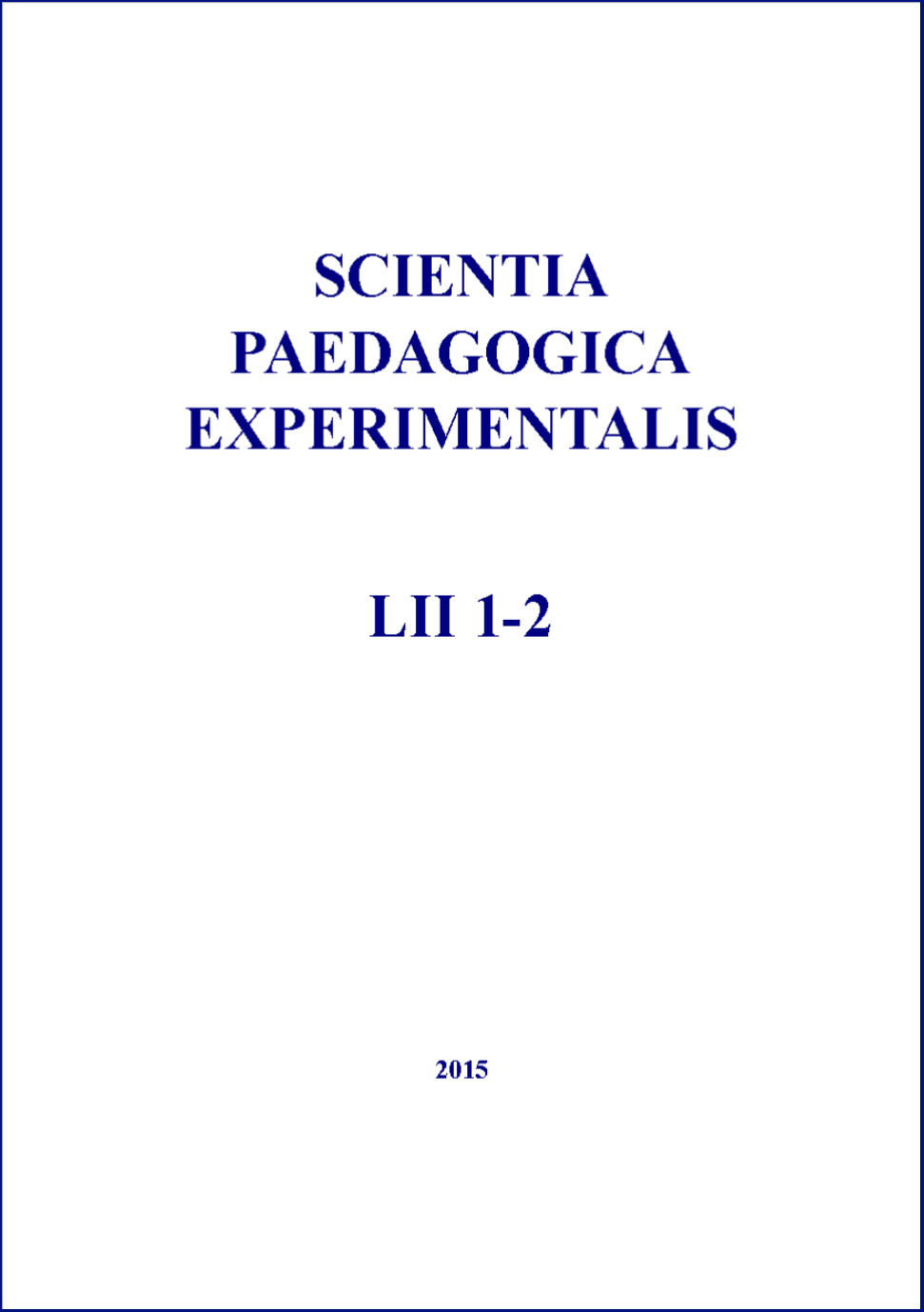
|
SMARTPHONE'S ACADEMIC USES IN EUROPEAN HIGHER EDUCATION AREA. A CASE STUDY IN SPANISH UNIVERSITIES Abstract Smartphones can be surprisingly useful didactic resources for developing academic tasks and competencies according to European Higher Education Area in both distance and face-to-face university studies. Through a quantitative analysis and factor analysis techniques, we have established the main smartphones' academic and general uses for improving learning processes in university subjects. To this end, a scale has been developed and validated to identify academic uses based on the participation of 419 Spanish college students from six Universities. The conclusions indicate that the use of smartphones in University studies is highly valued by students as a new format which both supports and enhances learning practices and can also foster collaborative work among students and professors. Therefore, it is recommended that universities continue developing new didactic strategies to connect both formal-informal and face-to-face ubiquitous learning settings. A FORMULA FOR AN OBJECTIVE MEASUREMENT OF STUDENTS’ UNDERSTANDING DIFFICULTIES OF A MATHEMATICAL TEXT. EVALUATIVE AND EDUCATIONAL USE Abstract This article provides an objective formula for the empirical evaluation of the understanding of a mathematical text by students of any level of education. Of this formula we suggest an evaluative and educational use. DEVELOPING AN E-LEARNING COURSE IN MOODLE FOR SOFTWARE TRAINING Abstract In this paper we present the implementation in MOODLE of an e-learning course for software training intended for advanced users of commercial software developed by a SME. The aim of this work has been to enhance the software training experience through e-Learning and to shorten the knowledge transfer path as compared to the classic software training approaches. To improve the e-course effectiveness we use e.g. video instructions, and add gamification elements to the course modules. The research presented in this paper was carried out in cooperation with, and with financial support of the European Thematic Network FETCH (Future Education and Training in Computing: How to Support Learning Anytime Anywhere, project number 539461-LLP-1-2013-1-BG-ERASMUS-ENW, http://fetch.ecs.uni-ruse.bg/). ANALYSE DES REPRÉSENTATIONS SOCIALES AU MOYEN D’UNE DÉMARCHE PLURI-MÉTHODOLOGIQUE Abstract This article aims to present a unique multi-methodological approach to collecting and analysing social representations by means of a questionnaire survey on the forms of education conducted with a total of 668 students of secondary education in Francophone Belgium. Four methods of analysis are used: the prototypical analysis, comparative analysis, control of the centrality and thematic analysis of open questions. The different methods, their practical implementation and the treatment support tools are presented and discussed. EARLY INTERCULTURAL EDUCATION – WROCLAW`S CONTEXTS AND PRACTICES Abstract The text provides an introduction to an innovative intercultural project implemented from 2013 in one of the preschools in Wroclaw, Poland. World War II with its massive expulsions and relocations increased the intercultural homogeneity of the city. However, in the last 20 years this trend has reversed, especially thanks to a growing community of foreign professionals working for the approx. 150 multinational corporations which have invested in the city. Moreover, public awareness for interculturality has been rising since Wroclaw was awarded the title of the European Capital of Culture 2016. The increasingly intercultural composition of the city’s population and the rising awareness for issues of interculturality also changes the image of childhood in a big city. The project presented in this article (project "Multicultural Wroclaw?") is an attempt to increase intercultural awareness among the children and equip them with skills for productive and tolerant ways of dealing with intercultural challenges in their city. |
|
SPE 52, 1-2 (2015)
|
|
||||||||||||
|
SPE 53, 1-2 (2016)
|
|
||||||||||
|
SPE 51, 1-2 (2014)
|
|
||||||||||||||
|
SPE 50, 1-2 (2013)
|
|
||||||||||||||||




